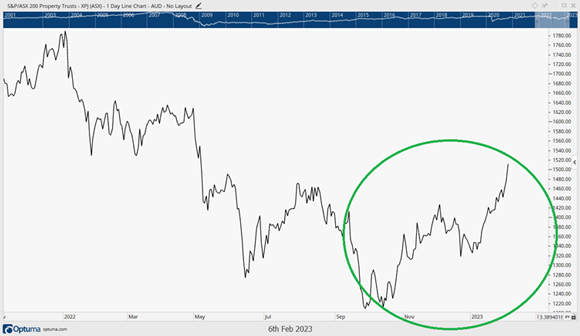I don’t have a new couch, but suddenly I feel like the Newman household should have one.
Apparently, Aussie consumers have been buying them up big!
Furniture retailer Nick Scali released its results this morning.
It smashed it out of the park too. Revenue is up 57% and net profit is up 70%.
Take a look at this line:
‘The Group had anticipated a slowdown compared to the Covid 19 boom yet trading remains better than pre Covid despite rising interest rates.
‘Nick Scali brand written sales orders were 12.1% below January 2022 and 22.9% above pre Covid January 2020.’
Hello! Everywhere I look, I’m supposed to see a recession, except it doesn’t show up.
ANZ Chief Shayne Elliott was cited in The Australian over the weekend saying that the percentage of ANZ mortgage loans that were 90 days past due for repayment was 0.5%. The long-term average is 1%.
But the mortgage cliff!
What about those billions in loans about to roll over from fixed rates to variable?
The Australian reports:
‘Mr Elliot said borrowers who had already rolled off ANZ’s fixed rates to markedly higher variable mortgages were actually “better performing” on their repayments than the average home loan borrower cohort.’
Go figure!
Here’s something else I came across.
The Age says Domain data shows that four-bedroom houses only fell 4% in 2022, compared to 8% for two-bedroom houses.
The implication is that small-fry investors took a hit from rising rates, but working families were able to shrug them off.
My colleague Catherine Cashmore says four-bedroom homes are tightly held and, therefore, there’s less stock around too.
That again suggests that middle Australia is getting along just fine.
We have retailers reporting cracking results, low defaults across the banks, and a roaring share market.
The good news is there are still plenty of stocks trading at cheap valuations, even with the general market a whisker off all-time highs.
I’ve said a few times in these pages that property-related stocks are one of those sectors.
Here’s a chart I shared with my subscribers in their monthly newsletter last week. It shows Real Estate Investment Trusts surging back to life recently.
Check it out:
|
|
| Source: Optuma |
One reason this sector got smashed was because of rising rates last year.
REITs are often treated as bond ‘proxies’ in the short term because they pay out their earnings as dividends.
Here’s the thing, though…
REITs are NOT like bonds and should NOT be treated as such.
In 2017, an investor called Nicholas Sproats studied and reported on US REIT returns during the (then) nine rising interest rate environments over the last 50 years.
Here’s what he found:
‘It’s a myth that there’s this infallible causation and effect between interest rates and real estate returns, and real estate has historically been a fantastic hedge against inflation, as we get to capture inflation and more in our leases.’
What matters for REITs over time is the same as every other stock!
And that is growth in profits.
The price they pay for debt is only one factor behind this.
We can’t ignore movements in commercial property values, rents, development work, tax changes, labour force movements, and all the other variables that can impact any business.
For example, many commercial buildings are shifting to solar to cut energy costs.
And take a look at the chart of the REIT sector again up above. The sector is now rising again.
However, some of the discounts between REIT share prices and their tangle valuations are still very big.
There are rumours that either big super funds or private equity may take some of the public ones over completely.
The Australian Financial Review reported the other week:
‘It’s 13-months since the gods of Australia’s commercial property scene warned big super was coming for the sector – and finally the message seems to be gathering some momentum outside of the real estate scene.
‘Bankers are running around with charts showing ridiculous trading at mainstay players like Dexus, GPT Group and a bunch of Charter Hall-run listed funds, which cannot shake their hefty discounts to net tangible asset backing.’
I agree. I recommended one REIT last year and just added another one this month. These are two ‘small-cap’ property plays.
They seem more likely takeover offers because their market cap isn’t in the billions of dollars.
And if no takeover eventuates?
You’re still earning at least 6% in dividends, with a cracking outlook for capital growth considering it’s relative low risk.
If that sounds of interest, check out the latest issue of Australian Small-Cap Investigator by starting here!
Best wishes,
 |
Callum Newman,
Editor, The Daily Reckoning Australia


